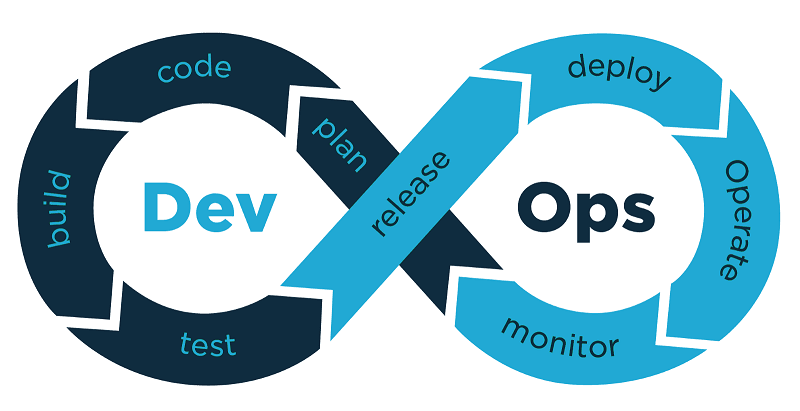Understanding DevOps and Its Importance
DevOps is an innovative approach to software development that combines development (Dev) and operations (Ops) teams, fostering collaboration and communication throughout the entire lifecycle of a product. This methodology emphasizes an agile development environment, automating processes to streamline workflows, enhance software delivery, and improve overall service reliability. In today’s fast-paced technological landscape, the significance of DevOps has become increasingly apparent, with numerous organizations adopting this model to accelerate their deployment capabilities.
One of the primary advantages of implementing DevOps is its ability to eliminate silos between development and operations teams. By promoting collaboration, organizations can achieve better alignment of goals, thereby facilitating faster problem identification and resolution. The integration of continuous integration and continuous deployment (CI/CD) practices into the DevOps framework automates testing and deployment, which in turn reduces time-to-market for new features and services. This efficiency is crucial in a competitive market, where rapid innovation is essential for success.
However, maintaining effective DevOps practices in-house can present significant challenges. Organizations may struggle with a lack of skilled personnel, inadequate tools, or an existing culture resistant to change. These barriers can hinder the implementation of robust DevOps strategies, making it difficult to fully realize the advantages and benefits of outsourcing your need for DevOps. By leveraging external expertise, companies can access specialized knowledge and resources tailored to their unique requirements. Outsourcing not only alleviates the pressures of hiring and training but also ensures that organizations can focus on their core competencies while benefiting from the agility and reliability that DevOps provides.
Cost-Effectiveness of Outsourcing DevOps
As organizations strive to achieve operational excellence, the financial implications of outsourcing your need for DevOps have surfaced as a compelling consideration. One of the primary advantages and benefits of outsourcing DevOps functions lies in the significant reduction of labor costs. By enlisting external experts, companies can circumvent the expense associated with recruiting, compensating, and retaining a full in-house team. This approach allows businesses to tap into specialized skill sets at a fraction of the cost, providing both flexibility and financial efficiency.
Moreover, outsourcing alleviates the burden of training and onboarding new employees, which can be a time-consuming and costly endeavor. Instead of investing resources into developing internal talent, companies can leverage the ready expertise of external providers. This immediate access to skilled professionals ensures faster project initiation and enhances production timelines, ultimately leading to operational efficiencies that drive further cost savings.
From a technical perspective, organizations also experience reduced expenses related to technology investments. In-house teams often necessitate ongoing investments in tools, infrastructure, and software licenses. By outsourcing DevOps needs, companies can benefit from the modern tools and technologies that service providers typically utilize, as they are committed to staying updated with industry standards. This not only minimizes capital expenditure but also optimizes operational performance due to the deployment of state-of-the-art solutions.
Furthermore, the scalability offered through outsourcing enables organizations to align their DevOps capabilities with fluctuating demands. Temporary spikes in project requirements can be seamlessly managed, allowing companies to avoid overstaffing or underutilizing resources. In this context, the financial advantages of outsourcing DevOps are undeniable. By focusing on core competencies while relying on external experts for technical execution, organizations can foster sustainable growth and stability in their operations.
Access to Expertise and Innovation
One of the primary advantages and benefits of outsourcing your need for DevOps lies in the accessibility to a broader pool of talent and specialized skills. In an industry characterized by rapid technological advancements, aligning with experts who are well-versed in the latest tools and methodologies can prove invaluable. Third-party providers often house teams of professionals with extensive experience in DevOps, allowing businesses to leverage their deep understanding of industry trends, best practices, and innovative solutions.
Outsourcing enables organizations to tap into these specialized skill sets, which may not be readily available within their existing workforce. As a result, companies can implement cutting-edge technologies and frameworks that might otherwise be out of reach. For many organizations, the knowledge and innovation brought by external teams can lead to optimized processes and enhanced performance.
Moreover, in the fast-evolving landscape of DevOps, innovation is a constant requirement. Established providers often invest in ongoing training and development for their teams, ensuring they stay current with the latest advancements and tools in the DevOps sector. This commitment to continual improvement not only benefits the outsourced teams but also reflects positively upon the companies that engage their services. By employing a dedicated team of specialists, organizations can accelerate their digital transformation while maintaining operational efficiency.
Furthermore, outsourcing your need for DevOps often provides a strategic advantage by instilling a mindset of flexibility and adaptability. Many outsourced teams have experience working with various industries and challenges, allowing them to bring fresh perspectives and creative solutions that may be less familiar to in-house teams. This cross-pollination of ideas and practices fosters a culture of innovation that can help businesses remain competitive in their respective markets.
Enhanced Focus on Core Business Functions
Outsourcing your need for DevOps provides a strategic avenue for organizations to concentrate on their core business functions. By delegating operational tasks and complexities to specialized service providers, companies can redirect internal resources toward their primary objectives. This shift not only alleviates the burden of managing extensive DevOps processes but also enables teams to focus on their areas of expertise, leading to improved efficiency and effectiveness in achieving business goals.
One of the primary advantages and benefits of outsourcing is the ability to enhance innovation within the organization. When teams are not preoccupied with the intricacies of deployment and system management, they have more freedom to explore creative solutions, develop new products, and enhance existing services. This newfound focus fosters a culture of innovation as employees can engage their skills in areas where they can make the most impact, ultimately contributing to company growth.
Moreover, outsourcing DevOps tasks can significantly enhance overall business agility. When organizations can quickly pivot and respond to market changes or technological advancements, they stand a better chance of staying ahead of the competition. The agility gained from outsourcing allows companies to implement changes and iterate on products faster, as the complexities of maintaining infrastructure and deployment processes are managed externally. This enhances not only responsiveness but also the overall operational stability of the organization.
In conclusion, the strategic decision to outsource your need for DevOps provides multiple advantages, including an enhanced focus on core business functions, increased innovation, and improved overall agility. By leveraging the expertise of external providers, organizations can effectively navigate operational complexities while concentrating on what they do best, ultimately driving growth and success in their respective fields.




